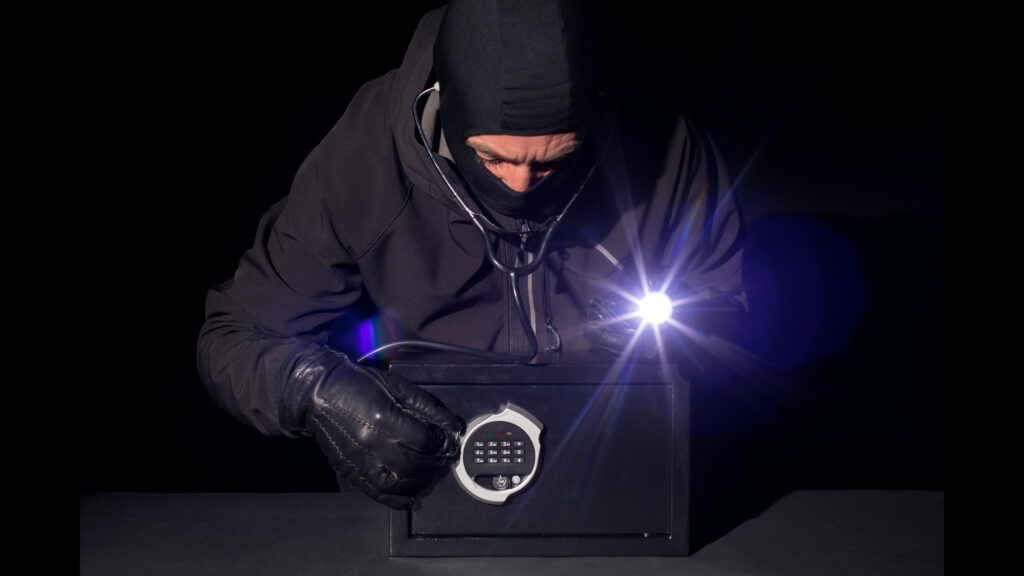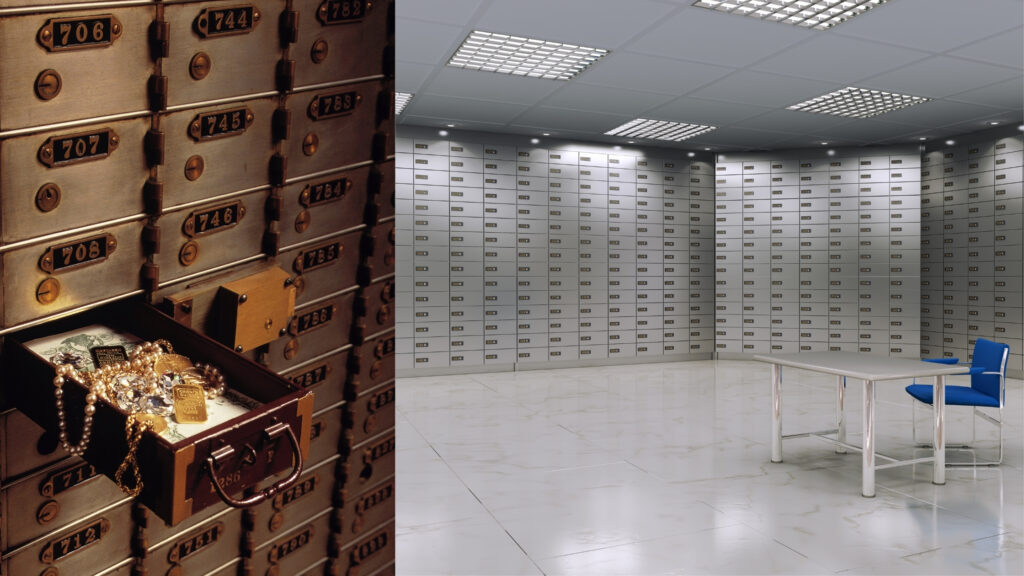We continue our series of how to buy gold and silver when we are looking at one of the most important considerations which are what is the best way to store gold?
Individuals who buy physical gold, in most cases, do it, to protect their and their family’s wealth. This feat is futile if you do not take great care of the safe storage of your precious gold and silver. If your gold or silver is exposed to the risk of theft you lose the whole reason why you bought gold in the first place.
Storing gold safely goes beyond securing it against theft. Have you ever thought about how you are going to protect your gold against government confiscation?
Confiscating gold by rogue governments is real and it is happening right now
As debt ridden governments are losing their grip on controlling their own finances they are turning to the “wealthy” private citizens to bail them out. There are very few countries if any that are immune against the states’ gross abuse of their power as they write and issue laws to legalize their activities of theft.
A perfect example is a Zimbabwean businessman Frank Buynga Sadiqi who lost 600 million Rands ($39 million) from confiscation by the South African Revenue Service (SARS). This is not old news of years ago. This story surfaced on 30 November 2020. What gives one the chills is the manner in which the raid on his assets was executed.
One wonders how much of his wealth will be recovered and how much could have disappeared in the system as the ANC dominated South African Government is well known for its countless abuse of the bureaucratic system and power to warrant their scandalize corrupt activities. Without boring the reader with too much detail it stretches from defense contracts to state capture. Even the 2010 soccer world cup bid was ridden with acts of bribery.
I was surprised and in disbelief about the careless manner in which Mr. Sadiqi protected his gold assets and wealth. Clearly, a man with financial means should have taken better precocious actions. The gold confiscation from Mr. Sadiq is a perfect example and real-life lesson for other gold investors of what is the best way to store gold.

Home storage is the first option for most startup gold investors
Normally the first fuel station on the gold investing journey is home storage. Although this is an option to save storage costs it is not advisable. The real danger is that you can pay the ultimate price with your life if the word of the gold at your home comes out.
There certainly are tips on how to store your gold at home but once the fact that you have a load of gold at home falls on the wrong ears it may be the end game for protecting not only your wealth but your life.
Why do people store gold at home?
There are many reasons why people store gold at home depending on individual circumstances. In general the most obvious reasons are:
- To save storage costs. Storage fees range from ⅓ % to 1 ¼ % depending on the depository and the account value.
- Admiring, feeling and holding their gold.
- To be near their gold in case of an emergency. People want to know that they have quick access to their own gold. In some extremes, people store gold at home for periods of doom and gloom believing that you are going to buy food and other necessities with it.
- Believing that through home storage it is outside of the banking system and away from the government’s reach.
- Bragging rights. People love to show off their gold collection even if it is the worst thing that a gold investor can do.
The pitfalls of storing gold at home

There are many CONS of home storage some of the pitfalls are:
- Safety and security risks. The safety and security risk may vary depending on which part of the world you live in. The risk of you or your loved ones being tortured to reveal the safe combination or key of your safe is real. This has happened before with people ending up paying with their lives.
- Buying the right safe and correctly installing it. The safe should be so heavy that more than two people would be required to carry it away with the right equipment.
The safe should be out of sight and it should be waterproof if buried under the ground. There are many hidden costs that you should consider before venturing into this on a grand scale.
To secretly install the correct safe, is difficult and inevitable some people will know about the valuables that you are going to store, increasing your security risk. - Taking all the safety measures makes it difficult for you to view your gold freely even at home, which could be the main reason why you store your precious metals at home in the first place.
- To turn your gold quickly into cash you have to take your gold coins or gold bars to a dealer to sell them. This may be very inconvenient. Certain types of gold bars may have to be first authenticated independently before you will get an offer which can be costly.
The alternative maybe to sell online but this can take a long time which is not ideal if you want a liquid asset. - Confiscation risk. Like in Mr. Sdiqi’s case, no matter how well you hide your gold it can be discovered if people know you have it and want to find it.
- Insurance for home storing gold is very expensive, that is if a insurance company will cover it at all. You also lose secrecy by revealing your gold stash to people you don’t know.
- Revealing your gold secret to at least one person. There is no point having gold for an emergency if no one can find it if you fall really ill. There is no protection for your family if your gold is not mentioned in your will and cannot be traced.
At least one person must know the combinations of your safe or have a spare key to your safe. Finding this one trusted person and burdening them with your troubles can be a major hassle.

When can you store gold at home?
It is simple if your gold investment is little. When you start your gold investments and you only have a few gold or silver coins it does not make sense to store them at a depository in a vault. The storage cost will eat faster into the gold value than its ability to grow in value.
Depending on your home security and your ability to keep a secret it is our opinion that you should not store more than $10,000 worth of gold or silver at home. If you live in a crime-free area and you have the means to have tight security you can slightly increase this amount before you place it in a third party vault.
If the gold price has to rise sharply before you can cover the cost of vault storage the time is not right for you to place your gold in storage.
If home storage is not ideal for investing in gold what are the other gold storage alternatives? There are two more options for storing gold.

Safe deposit box rentals
Banks in particular offer safe deposit box rentals where anything of value can be placed under the relatively safe and secure environment of the bank.

What are the pros and cons of storing gold in a safe deposit box?
The PROS of safe deposit box rentals
The benefits of safety deposit boxes are surprisingly limited.
- Safe security boxes at the bank are more secure than home storage and protected 24/7. They are locked with high-security locks and are protected by alarms and difficult to reach physically within the bank.
The risk of a robbery at your home is much lower if you place your gold and silver in a rented safe deposit box. - Renting a safe deposit box is a relatively cheap option.
- You can store anything of value in a safe deposit box from precious metals, gemstones to secret documents and wills.
The CONS of safe deposit box rentals
Leased safe security boxes are not that popular anymore for storing precious metals. When you look at the downside of rented safety boxes it is clear why.
- The whole point of safe deposit boxes is secrecy so how can you insure something that you do not want to reveal to anyone? The banks do not offer insurance in case of theft, because they are not supposed to know what is in the safe deposit box in the first place. The chance of large scale robbery is slim but there is a possibility that it can take place. In which case you can lose all your valuables.
- The banks closed during the banking crisis in 1933 prohibiting people from gaining access to their cash and assets. In March 2013 banks in Cyprus closed their doors for nearly 2 weeks. An angry depositor even tried to recover his savings by driving a bulldozer into the bank.
The banking sector is under pressure worldwide in an environment of zero interest rates. In case of a bank crisis or even bankruptcy, you will not be able to gain access to your safe deposit box. It is not illegal for banks to stop people from access to their vaults and their safety deposit boxes.
“There are an estimated 25 million safe deposit boxes in America and they operate in a legal gray zone within the highly regulated banking industry. There are no federal laws governing the boxes; no rules require banks to compensate customers if their property is stolen or destroyed. Every year, a few hundred customers report to the authorities that valuable items — art, memorabilia, diamonds, jewelry, rare coins, stacks of cash — have disappeared from their safe deposit boxes” – The New York Times. - The limited storage capacity of a safe deposit box is costly to store precious metals because the price that you pay is high in comparison to the space that you get. Gold and especially silver can take up a fairly large space for which you pay a premium in a safe deposit box which will devour your gains of the gold price increase.
The less gold you have in the safe deposit box, the higher the price would be per ounce that you store and your space is limited. - Taking your gold to the bank or removing it from the bank can be dangerous.
- You can only access your gold during the times that the bank is open. This defeats the object of having gold in case of emergencies or quickly sell your gold in case of a bull run in gold.
Gold Storing Depositories
The third option of storing your gold is in an independent safety vault. Within this system, there are a few options available but we are only going to discuss gold and silver stored directly in your name.
The PROS of gold depositories
- Secure vault facilities with unlimited space for an unlimited quantity of gold and silver. These vault facilities operate under the strictness security standards which will ensure that your gold and silver is secure.
- A storage contract is signed with the storage company with the identity of the investor and the serial numbers of the gold bars allocated to the investor. The storage takes place outside of the banking system. The investor is not exposed to banking risks and bank bankruptcy.
The contract between you and the depository is executed discreetly in confidentiality. - Storage companies are governed by the country’s laws with regard to the logistics and storage of precious metals. It is much more tightly regulated than the gray zones within the banking laws and other intermediaries.
- Depositories are regularly independently audited that guarantees that the gold bars owned by investors really exist and correspond to the storage certificates issued.
- Insurance is offered by the depositories in the extremely rare cases of theft of your gold.
- With vaults available in various international locations, you can diversify your gold investment across the globe. A national crisis will not adversely affect your gold holdings when you have placed your gold and silver across the globe.
For example, Goldbroker offers vault facilities that are strategically located for storage in:
 | Switzerland |
 | Singapore |
 | New York – USA |
 | Canada |
- You are protected from government confiscation and asset seizures.
- With guarded armed transport to vaults, you do not have to physically deliver and take the gold to and from the vaults.
- You can arrange for direct and personal access to the vault by appointment to inspect and take possession of your gold and silver. The storage facilities provide comfortable and discreet surroundings to view your gold.
- The gold can remain within the professional logistics chain when trading with real physical gold which ensures that the gold retains its maximum resale value.
- Any movement of gold has to happen under your specific instructions and authorizations as the client. This ensures that the gold you own remains under your control even though you don’t physically store it yourself.
The CONS of gold depositories
- The biggest disadvantage of depositories is the fees that are payable. To achieve optimal benefit from vault storage you must own a considerable amount of gold. In our opinion, it must be at least worth more than $10,000 of gold or silver.
- Some depository clients have to travel long distances to visit the vaults. Specific arrangements also need to be made to visit these establishments to view your gold.
- You do not have immediate direct access to your gold in case of emergencies as you first need to make the required arrangements to collect or have your gold delivered to you. The ability to have your gold physical delivered to your doorstep is actually a big advantage offered by depositories.
Final thoughts
If you lose your gold it is gone. Other than other financial assets which can issue a replacement certificate or a new copy of a title deed, gold can be lost without any option to replace it at no or little costs.
It is therefore not only important to know how to buy gold but also to know how to store it. The best way to store gold in my opinion is to have it placed in an independently operated secure vault outside of the banking system or other intermediaries.
Independent storage by a third-party depository might not be the best option for startup gold investors or people who only have a few gold coins, due to the costs involved.
If you only have a limited amount of gold the best way to store gold is securely at home. Remember to keep it a secret and to follow safety protocols of securing your gold and your life.



Very interesting post. I had not thought of the possibility of accumulating gold for wealth. As I research this more, I will definitely keep this article in mind as I probably would have purchased a safe and stored it in my home. Based on what I have read here, it is obvious that is not a good idea and I will ensure I do not not keep anything like that in my home.
This has caused me to evaluate what jewelry we have here in our home and really think about a safety deposit box moving forward.
I think you make an excellent point about storing jewelry in a safe deposit box. Gemstones like diamonds used in jewelry and that are very expensive are ideal candidates for safe deposit boxes. They take up less space than precious metals.
If you are happy with the risk associated with the banking sector and you live in an economically & politically stable part of the world it is an option. Just remember that banks do not take responsibility for any losses you might incur from your safe deposit box.
Personally I think storing your gold at home is a very good point! My parents have done this over the many years and have made sure that their gold is always in it’s original packaging and put away safe and sound, locked up in their loft! What you are saying though does make sense because if anything went wrong with the house then the gold would be gone. You have shared some really great points!
Hi Michael thank you for your comment. Having gold at home is not a bad idea for small investors. Once you stand to lose a great deal of wealth especially in a bull market like we are currently experiencing you stand to lose a great deal.
Hi there! Thanks for sharing this article on how to store your gold. It’s true what you said that it’s one thing to know how to buy gold and where to get it, and it’s another thing to know how to store gold. Keeping your gold at home it’s a no no and though it has its own advantages, the disadvantages for me outweighs the advantages. Sticking with your advice on storing it in a safe vault. I’m not really a gold investor but this will come in handy one day. Thank you
Thanks for your comment. When you ever get the opportunity to safeguard your wealth with gold and silver you can always return to this article as a refresher.
It doesn’t seem like there is any way to store gold that is foolproof. What’s to stop the government from taking over the third-party gold storage facility by force? If a nation-state wants your gold, I doubt a third-party depository is going to stop them from getting it. with that being said, it seems like the third-party depository is the best option out of all the options available.
Thank you for your comment. A gold depository is actually foolproof because it is governed by that country’s laws and not your resident country. A country like Switzerland has an excellent track record of protecting human rights and individual freedom. If you place your gold in their care it is relatively safe.
This article is also written for moral-abiding citizens and not for the purpose of criminals to hide their illegal thefts and drug traffic money.
I guess my point is it’s only foolproof if the country the depository is located in doesn’t show up at the depository with its Army demanding the depository hand over the gold. I mean didn’t the United States make owning gold illegal in the early 1930s? It’s not too far-fetched to think a country would make it illegal and then raid “illegal depositories”.
Excellent comment. You are right it happened in 1933 in the USA. It is impossible to completely nullify the asset ownership risk of any asset. In certain countries, governments grab your ownership title of the property that you bought. This happened to me.
Would you argue that by diversifying your gold depositories over a number of “developed countries” that you can mitigate the risk of confiscation?